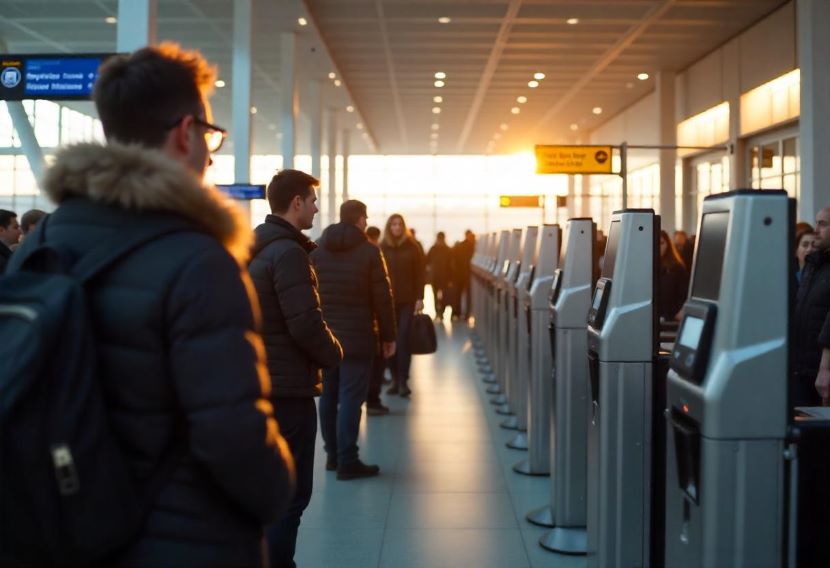Home » TRAVEL NEWS » Germany Offers Glimmer of Hope for UK Travelers Struggling Post-Brexit
Friday, July 18, 2025
Germany is set to introduce e-passport gates for Britons, offering hope for holidaymakers and business travellers who’ve faced heightened barriers post-Brexit. And although this latest development is designed to simplify entering the airport, there are many complications that remain for Brits to navigate while traveling in Europe post-Brexit.
German EasyPass will be implemented initially by 31 August 2025, with frequent visitors, business travel, and for visits to family resident in Germany amongst the planned first applications. EasyPass is a system for the electronic border control taking biometric data from e-passports, and applying facial recognition to that data. Citizens from other countries, like the United States, South Korea and China already have access to this system.
EasyPass enrolment for UK citizens UK nationals wishing to subscribe to EasyPass have to register at participating german airports, go through an initial passport check and a short interview. Upon registration, e-gates can be used during subsequent trips, but the secondary check at the border control counter is still required. So, UK passport holders will use the new e-gates, but they will also be subject to manual passport stamping, while EU nationals receive special treatment at the UK border.
It marks the first step in a larger bilateral deal between the UK and Germany, with the agreement overseen by Prime Minister Keir Starmer and German Chancellor Friedrich Merz. This is an effort to cut down on queuing and waiting at Germany’s main airports, including Berlin Brandenburg and Frankfurt am Main, and will help to make travel even easier for millions of Brits who visit the country every year.
But remember tourists should all be realistic. While e-gates can help clear initial passport checks, they don’t get rid of all Brexit-related hurdles. British travellers are still subject to tight rules on travel between the Schengen area, with trips limited to 90 days within any 180-day period. It’s all about careful planning…especially if you are a frequent visitor to Europe.
Brexit has undoubtedly resulted in obstacles for British travelers—strict passport validity rules led to many being turned away at UK airports. When the UK became a “third-country” following departure from the EU, there is more scrutiny on British citizens at border controls, it’s taking longer to process and the amount of paperwork has increased.
For British business travellers at least, the roll-out of e-gates in Germany has some real-world advantages. “By not having to wait at passport control, business travelers are able to maximise productivity,” the consultant said in a statement, “precious minutes that can be reclaimed for the face-to-face meetings that are so pivotal to the likes of finance, IT, consulting and healthcare.” But Brexit does, and will continue for the foreseeable future, meaning restrictions from Brexit do weigh heavily on the overall ease of doing business in the EU.
While leisure travelers who are bound for popular German destinations such as Berlin, Munich or Cologne will love the shorter lines, especially eater travelers (for the Christmas markets or Oktoberfest). Travellers must, however, stay alert, with passports needing to have at least three months’ validity beyond the date that travellers intend to leave the Schengen area, as well as the presentation of proof of funds and bookings.
There are also added intricacies with rail journey between the UK and Europe. For its part, the UK Transport Secretary, Heidi Alexander, raised the possibility of a direct rail link between London and Berlin by 2030, although logistical hurdles involved in passport control in key transport points like London St Pancras International are enormous. These are of course all further indications of how Brexit is already having negative effects on tourism, although perhaps less so in the UK than in Germany – apart from Germany’s e-gates all these hassles are unilateral British efforts.
UK Travel Tips to Germany After Brexit:
Check passport is valid (three months after date of return)omitempty: yes.
Bring hard copies of your return tickets, hotel reservations and financial proofs.
Save time by pre-registering for Germany’s EasyPass at eligible airports.
Keep up to date with Schengen area entry and exit rules.
Keep checking travel advice from UK and German government websites, which are being updated regularly.
Other useful details for visitors are knowledge of the fact that Germany enjoys a very efficient public transport network with the country’s Deutschland Ticket enabling unlimited cheap nationwide travel by public transport, improving traveller convenience once in the country.
Ultimately, however, some experts believe that if travellers are to be saved from the deep structural issues that Brexit has forced upon them, a much broader, more comprehensive renegotiation between the UK and the EU must take place. Streamlining visa and permission protocols and restoring former levels of mobility are major goals in future diplomatic revelations.
In the end, while e-gates coming to Germany is good news for all of us that hate standing in line, the reality is grim. UK holidaymakers and business travellers are still navigating a complex border regime caused by Brexit. While these modest enhancements are welcome, they also serve to underline the ongoing need for concrete measures to reflect the fundamental nature of the UK’s relationship with Europe.
Source: Independent.co.uk
Tags: berlin, Berlin Travel, border control, Brexit, Business Travel, e-Gates, EasyPass, EU travel, Europe, Eurostar, frequent flyers, germany, Germany airports., london, London to Berlin, passport control, Passport Validity, Schengen area., Schengen zone, Tallinn, Tourism Impact, Tourism industry, Travel convenience, Travel Regulations, travel restrictions, Travel tips, UK travellers, UK-EU relations, United Kingdom
